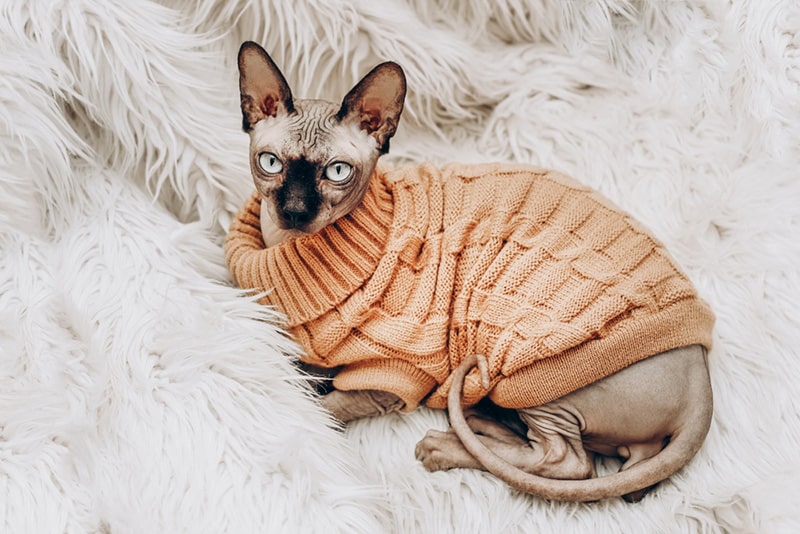Seeing a cat in a sweater may be an adorable sight, and you can find countless memes and photos of cats wearing sweaters on the Internet, but have you ever wondered if cats actually need to wear sweaters? Do they like wearing sweaters? In short, cats do not need sweaters because they have their fur to keep them warm, and they generally do not like wearing them either. Let’s put it this way: wearing sweaters is unnatural to cats, and odds are, they prefer not to have them on.
Read on to discover more information about cats wearing sweaters and the potential hazards they may bring.
Do Cats Need Sweaters?
No, cats do not need to wear sweaters. Even if you live in a cold climate, your cat will still not need a sweater. Since sweaters are unnatural to cats, it’s best to refrain from putting them on. Cats have fur for a reason, and their fur helps keep them warm in cold temperatures. Cats also have the natural ability to regulate their body temperature, so a sweater is not needed because it hinders the process by covering up the fur and skin.

Are There Hazards to Cats Wearing Sweaters?
While it’s cute as a button to see a cat in a sweater, the cute factor does not go without risks. For starters, a sweater could cause your cat to overheat. As a result, your cat could suffer from heatstroke.
Putting a sweater on your cat could also hinder or obstruct their normal movements, which could cause injury. For example, your cat could get tangled up in the sweater trying to get it off. If your cat is an indoor/outdoor cat, the sweater could get caught on a tree branch or some other object, causing your cat to become stuck or, even worse, presenting a choking hazard.
Stress is another possibility that wearing a sweater can lead to.
Can Hairless Cat Breeds Wear Sweaters?
An exception to the rule is hairless cats, such as the Sphynx or Peterbald cat breeds. If you have a hairless cat, a sweater may come in handy if you live in a cold climate. Hairless cats chill more easily, but even hairless cats do not need sweaters. Just be sure to keep them indoors if it’s cold outside.
A cat who has recently undergone surgery could benefit from wearing a sweater due to the shaved areas of the surgical site. Some vets will recommend either a body suit or a T-shirt to help keep the cat from licking the incision site and to help keep them warm during recovery.

How to Safely Put a Sweater on Your Cat
In the event a sweater is warranted for your cat, you’ll need to ensure you put the sweater on safely. A significant factor is ensuring the sweater is not too tight or too loose. If it’s too tight, your cat will be uncomfortable and will most likely try anything and everything to get out of it. If it’s too loose, your cat can easily ditch the sweater. The sweater should be on the fitting side—not too loose or too tight.
It will take time for your cat to acclimate to having a garment on, as cats typically do not like wearing clothing of any kind. Avoid forcing your cat into a sweater, and go slowly. The first course of action is to put the head through, then put the front feet through and observe your cat’s reaction. If your cat tries aimlessly to get out of it each time you engage in this process, odds are your cat will never tolerate it, and the process should be aborted permanently.
If your cat seems to tolerate this process, leave the sweater on for short increments. In time, your cat will adjust to having it on. You can even grab your cat’s favorite toy and engage in playtime while he’s wearing the sweater for added security and comfort.

Tips for Keeping Your Cat Safe in Extreme Weather Conditions
As a general rule, if you’re cold, your cat is also cold. If you live in a cold climate, there are ways you can ensure your cat stays warm and comfortable without the use of a sweater. For example, some people turn the heat off inside the home when they are gone, even if their cat is still home. To keep your cat cozy, make sure the temperature stays comfortable! Many cat owners may leave their cats at home when traveling and turn off the heat to conserve energy. However, this will only make your cat cold and miserable.
If you have an indoor/outdoor cat, leave your cat inside on cold days. If you have an outdoor cat that has been outside in cold temps, watch for signs of being too cold, such as:
- Trembling
- Tightly tucking the limbs or tail underneath the body
- Seeking out heat sources from patches of sunlight or lamps
If your cat is cold, ensure you have the heat on. If you have a fireplace, crank up a fire for added warmth- just beware that the cats don’t get too close or are left unattended around it.

Conclusion
To sum this topic up, cats do not need sweaters, and they particularly don’t like wearing them. Cats have their fur for a reason, and they have the ability to regulate their own body temperature without the use of garments. There are some instances when a sweater is warranted, such as for hairless cats or after surgery, but cats don’t actually need them. It’s also important to never leave your cat in a sweater unattended in case they get snagged on something or hurt themself by trying to escape.
See also:
- Do Cats Get Sad When You Leave for Vacation? Feline Feelings Explained
- 5 Cats Who Inherited Fortunes – List of the Richest Cats in the World
Featured Image Credit: GolubaPhoto, Shutterstock









